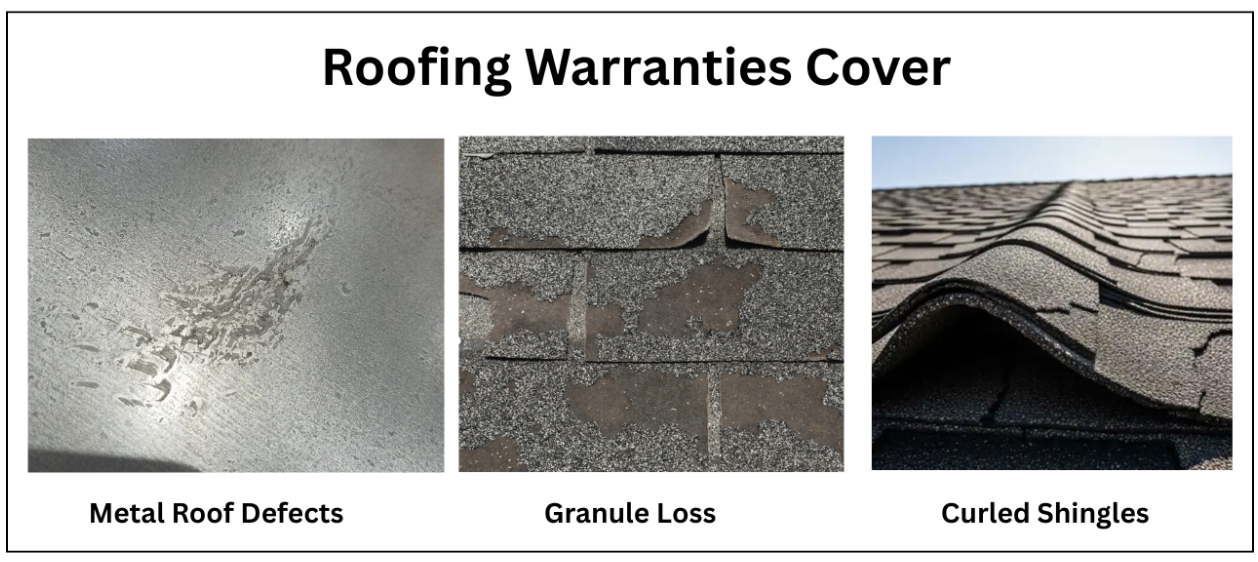When you hear “Your roof has a 30-year roof warranty or even a 50-year warranty,” does that mean your roof is fully protected for 30 years? Not exactly.
Many Indiana homeowners are surprised to learn that roofing warranties don’t cover everything, and that the fine print often determines whether a claim gets approved or denied.
At Hoel Roofing, we help homeowners understand their coverage before they ever need it. As a certified roofing contractor serving Indiana, we’ve worked with major manufacturers like Owens Corning, CertainTeed, Marlarkey, and GAF, so we know exactly how warranty terms really work.
In this article, you’ll learn what roofing warranties actually cover, what they leave out, and how to make sure you don’t void yours by accident.
A roofing warranty is your manufacturer’s and contractor’s promise that your roof will perform as intended, within certain limits.
There are two main types every homeowner should understand:
Together, these warranties help ensure your roof performs the way it should—and that you’re protected if it doesn’t. Next, let’s look at the different types of roof warranties available so you can understand the various types of roof warranties.
Not all roofing warranties offer the same protection. Some only cover the basic materials, while others include both materials and labor, or even extend coverage to future homeowners. The different types are:
This is the standard warranty that comes with your roofing materials. It protects against:
The manufacturer’s material warranty doesn’t cover installation mistakes, weather damage, or poor maintenance.
Issued by your roofing company, this warranty covers labor and installation. Even the best materials fail if installed incorrectly, which makes this warranty crucial. Workmanship warranty ensures that if a problem stems from a roofing company’s error in installation, they’ll make it right at no extra cost.
Some manufacturers (like Owens Corning, GAF, and Marlarkey) offer extended coverage when your roof is installed by a certified contractor and registered with them.
These warranties can include:

Roofing warranties typically cover:
| What’s Covered | What It Means | Example |
| Defects in shingles or metal panels | If your roofing materials were manufactured incorrectly, the company will replace the faulty materials. | Shingles made with the wrong asphalt mix or metal panels with poor factory coating. |
| Premature granule loss | Asphalt shingles are coated with small granules that protect against UV rays and rain. If those granules fall off too early, it’s usually a sign of a manufacturing problem. | Granules start collecting in your gutters just a few years after installation. |
| Certain manufacturing flaws | Problems like curling, cracking, or blistering shingles that happen too soon are often tied to material defects, not normal wear. | Shingles begin curling after two summers instead of lasting decades. |
| Installation errors (if covered by a workmanship warranty) | If your contractor offers a workmanship warranty, they’ll fix leaks or problems caused by improper installation. | Nails placed incorrectly, bad flashing, or uneven shingle alignment causing leaks. |
Roofing warranties do not cover:
Keeping your warranty active requires a little maintenance and documentation. Here’s how to do it:
| Brand | Material Coverage | Workmanship | Transferable? | Length |
| Owens Corning | 25–50 years | Optional | Yes | Varies |
| GAF | Lifetime (limited) | Certified installer required | Yes | Varies |
| Malarkey | Limited Lifetime (on architectural and designer shingles) | Available when installed by a Malarkey Certified Contractor | Yes | Typically 25–50 years, depending on the product |
| CertainTeed | Up to 50 years | With a certified contractor | Yes | Varies |
Does a roof warranty cover leaks?
Only if the leak results from a covered material defect or installation issue, and not from weather, age, or neglect.
Are roof warranties transferable?
Yes, most are, if transferred within a specific timeframe (usually 30–60 days after home sale).
How long does a roof warranty last?
Manufacturer warranties last 25–50 years; workmanship warranties usually cover 5–10 years.
File a warranty claim if:
A roofing warranty can save you thousands, but only if you understand what’s covered, who’s responsible, and how to keep it valid.
At Hoel Roofing, we are certified installers of Owens Corning and Marlarley shingles, and we offer roofing installation, repair, and warranty guidance for homeowners across Indiana. We’ll help you read the fine print, register your warranty, and make sure your roof performs exactly as promised. Schedule a free roof inspection today before the next storm tests your coverage.
If damage came from hail, wind, or fallen debris, you should check out our article Dealing With Roof Damage From A Storm? Call A Roofer Before Your Insurance to understand what your next steps should be.
Toyosi Ogunsola is the Content Manager at Hoel Roofing & Remodeling in Rushville, IN, where she oversees the creation of educational, trustworthy content about roofing, remodeling, and home improvement. With a master’s degree in Emerging Media Design and Development and a background spanning content strategy, UX research, and digital marketing, Toyosi combines data-driven insights with clear, engaging writing to help homeowners make informed decisions. Passionate about translating complex roofing topics into helpful resources, she works closely with Hoel’s team of roofing experts to ensure every piece of content is accurate, practical, and user-focused.